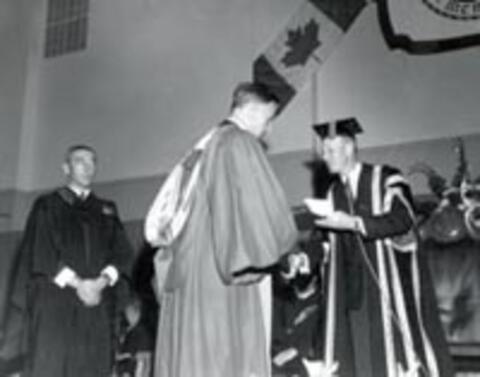
Title and statement of responsibility area
Title proper
Honourary Degrees - Presentation - John Kenneth Galbraith
General material designation
- Graphic material
Parallel title
Other title information
Title statements of responsibility
Title notes
Level of description
Item
Reference code
Edition area
Edition statement
Edition statement of responsibility
Class of material specific details area
Statement of scale (cartographic)
Statement of projection (cartographic)
Statement of coordinates (cartographic)
Statement of scale (architectural)
Issuing jurisdiction and denomination (philatelic)
Dates of creation area
Date(s)
-
20 May 1965 (Creation)
Physical description area
Physical description
1 photograph : b&w ; 12.8 x 8.9 cm
Publisher's series area
Title proper of publisher's series
Parallel titles of publisher's series
Other title information of publisher's series
Statement of responsibility relating to publisher's series
Numbering within publisher's series
Note on publisher's series
Archival description area
Name of creator
Custodial history
Scope and content
E.M. (Ted) Culliton, University Chancellor, making presentation of an Honourary Degree to John Kenneth Galbraith at the 54th spring Convocation held in Physical Education gymnasium. Norman K. Cram, University Secretary, stands at left.
Bio/Historical Note: John Kenneth Galbraith, known as Ken Galbraith, was born in 1908 at Iona Station, Ontario. After study at the University of Toronto’s Ontario Agricultural College (now part of the University of Guelph; BS 1931) and the University of California, Berkeley (PhD 1934), Galbraith, who became a U.S. citizen in 1937, taught successively at Harvard and Princeton universities until 1942. During World War II and the postwar period, he held a variety of government posts and served as editor of Fortune magazine (1943-1948) before resuming his academic career at Harvard in 1948. He established himself as a politically active liberal academician with a talent for communicating with the reading public. A key adviser to President John F. Kennedy, Galbraith served as ambassador to India from 1961 to 1963, when he returned again to Harvard; he became professor emeritus in 1975. He also continued his involvement in public affairs, and in 1967-1968 he was national chairman of Americans for Democratic Action. Galbraith’s major works included American Capitalism: The Concept of Countervailing Power (1951), in which he questioned the competitive ideal in industrial organization. In his popular critique of the wealth gap, The Affluent Society (1958), Galbraith faulted the “conventional wisdom” of American economic policies and called for less spending on consumer goods and more spending on government programs. In The New Industrial State (1967) he envisioned a growing similarity between “managerial” capitalism and socialism and called for intellectual and political changes to stem what he saw as a decline of competitiveness in the American economy. Among his many other works were The Great Crash, 1929 (1955), The Liberal Hour (1960), Ambassador’s Journal (1969), A Life in Our Times: Memoirs (1981), The Anatomy of Power (1983), Economics in Perspective: A Critical History (1987), and The Culture of Contentment (1992). He was awarded the Presidential Medal of Freedom in 1946 and 2000. Galbraith died in 2006 in Cambridge, Massachusetts, at age 96.
Notes area
Physical condition
Immediate source of acquisition
Arrangement
Language of material
Script of material
Location of originals
Availability of other formats
Restrictions on access
Terms governing use, reproduction, and publication
Photographer: Gibson
Other terms: Copyright: University of Saskatchewan
Finding aids
Associated materials
Accruals
General note
Similar to item A-1787.

